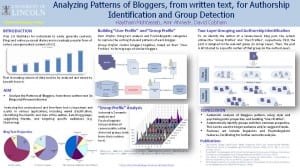Amr participated in the Write-UP workshop of the SUS-IT project consortium (which Amr is a partner in), on 17th and 18th May in Loughborough. Interesting to meet most of the partners, from all over the UK. Many discussions across the work-packages, especially with completion of the project (started in Jan 2009) expected ~mid next year.
Year: 2011
GraVision’11 Summer School {LSoCS-Lincoln}
The Lincoln School of Computer Science (LSoCS) is proud to host this year’s CGVIA summer school, in collaboration with the Arab Academy for Science, Technology & Maritime Transport (AASTMT), London International Office. Poster, details, program and registration online at www.lincoln.ac.uk/summerschools/CS
This is an excellent opportunity to have a taste of studying and living in the UK, in the historic city of Lincoln.
The Summer School 2011 will provide a challenging combination of taught, practical and hands-on activities, with concluding mini projects and presentations. There will be an emphasis on the Computer Graphics and vision with focus on interactive applications such as games and virtual reality. Participants will be exposed to a range of technologies, including MotionCapture, and research activities carried out in Lincoln. They will also be fully supported and have access to the School’s computing and research laboratories as well as other University’s facilities. The overall program falls within the following topics:
• Introduction to Computer Graphics. • Interactive Graphics and Visualisation applications. • Introduction to Image Processing/Computer Vision. • Non-conventional Interactions (e.g. WiiMote, Vision-based interaction).
The program will also include:
• Local/regional tours/trips, including scientific sites, and Guest Speakers. • Career Advice, Employability and Skills development. (e.g. Academic Writing, CV writing, Interview tips)
The Summer School is designed for students and recent graduates who are interested in computer graphics, computer vision, visualisation, games, and virtual reality. Tutors include research-active academics and researchers with various cultural and international backgrounds. A certificate of attendance will be presented to all those who successfully complete the Summer School.
For the best benefits, participants are expected to have a good level of programming (C/C++) and Mathematics. Places will be limited on a first come first serve basis.
www.lincoln.ac.uk/summerschools/CS
Analyzing Bloggers’ Patterns, from written text only.
Analyzing Patterns of Bloggers for Authorship Identification and Group Detection.
Haytham Mohtasseb, Amr Ahmed*, David Cobham
INTRODUCTION
Web 2.0 facilitates for individuals to easily generate contents. Blogs and online personal diaries are increasingly popular form of online user-generated contents (UGC).
That increasing volume of data need to be analysed and mined to benefit from it.
AIM
Analysing this unstructured and free-form text is important and useful in various applications including mood classification, identifying the identify and style of the author, detecting groups, suggesting friends, and targeting specific audiences (e.g. Marketing).
Building “User Profile” and “Group Profile”
User Profile: Using text analysis and Psycholinguistic categories to capture the writing style and patterns of each blogger.
Group Profile: Cluster bloggers together, based on their “User Profiles” to form groups of similar bloggers.
“Group Profile” Analysis
Automatic Semantic analysis and Psycholinguistic interpretation of commonality within detected groups (only from their written text).
Two-Layer Grouping and Authorship Identification
To an identify the author of a (anonymous) blog post, the system utilises the “Group Profiles” and “User Profiles”, respectively. First, the post is assigned to the relevant group (in Group Layer). Then, the post is attributed to a specific Author of that group (in the Author Layer).
CONCLUSION
Publications
- Two-layered Blogger identification model integrating profile and instance-based methods
Mohtasseb Billah, Haytham and Ahmed, Amr (2012) Two-layered Blogger identification model integrating profile and instance-based methods. Knowledge and Information Systems, 31 (1). pp. 1-21. ISSN 0219-1377 - PSYCHONET 2: contextualized and enriched psycholinguistic commonsense ontology
Mohtasseb Billah, Haytham and Ahmed, Amr and Altadmri, Amjad and Cobham, David (2011) PSYCHONET 2: contextualized and enriched psycholinguistic commonsense ontology. In: KEOD 2011 – International Conference on Knowledge Engineering and Ontology Development, 25 – 29 October 2011, Paris, France. - The affects of demographics differentiations on authorship identification
Mohtasseb Billah, Haytham and Ahmed, Amr (2010) The affects of demographics differentiations on authorship identification. Electronic Engineering and Computing Technology; Lecture Notes in Electrical Engineering 2010, 60 . pp. 409-417. ISSN 1876-1100. - PsychoNet: a psycholinguistc commonsense ontology
Mohtasseb , Haytham and Ahmed, Amr (2010) PsychoNet: a psycholinguistc commonsense ontology. In: KEOD 2010 International Conference on Knowledge Engineering and Ontology Development part of IC3K, 25 – 28 October, 2010, Valencia, Spain. - More blogging features for author identification
Mohtasseb, Haytham and Ahmed, Amr (2009) More blogging features for author identification. In: The 2009 International Conference on Knowledge Discovery (ICKD’09), 2009, Manila. - Mining online diaries for blogger identification
Mohtasseb , Haytham and Ahmed, Amr (2009) Mining online diaries for blogger identification. In: The 2009 International Conference of Data Mining and Knowledge Engineering – The World Congress on Engineering, 1 – 3 July, 2009, London, UK.
